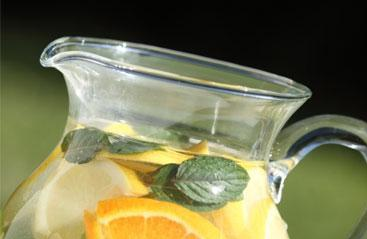Healthy Drinks
Water is the best choice for quenching your thirst. Coffee and tea, without added sweeteners, are healthy choices, too.
Some beverages should be limited or consumed in moderation, including diet drinks, fruit juice and milk. Alcohol in moderation can be healthy for some people, but not everyone.
Avoid sugary drinks like soda, sports beverages, and energy drinks.
Water
There are many options for what to drink, but for most people who have access to safe drinking water, water is the best choice: It’s calorie-free, and it’s as easy to find as the nearest tap.
Water provides everything the body needs—pure H2O—to restore fluids lost through metabolism, breathing, sweating, and the removal of waste. It’s the perfect beverage for quenching thirst and re-hydrating your system.
How much water do I need?
There is no one estimate for how much water the average American needs each day. Instead, the Institute of Medicine has set an adequate intake of 125 ounces (about 15 cups) for men and 91 ounces (about 11 cups) for women. (1) Note that this is not a daily target, but a general guide. In most people, about 80% of this water volume comes from beverages; the rest comes from food.
Water is an excellent calorie-free, sugar-free choice. For some people who are accustomed to drinking sweet beverages, water can initially taste bland. To increase water consumption without losing flavor or to spice up your daily water intake, try these refreshing water-based beverages:
Infused water
Instead of purchasing expensive flavored waters in the grocery store, you can easily make your own at home. Try adding any of the following to a cold glass or pitcher of water:
Sliced citrus fruits or zest (lemon, lime, orange, grapefruit)
Crushed fresh mint
Peeled, sliced fresh ginger or sliced cucumber
Crushed berries
Sparkling water with a splash of juice
Sparkling juices may have as many calories as sugary soda pop. Instead, make your own sparkling juice at home with 12 ounces of sparkling water and just an ounce or two of juice. For additional flavor, add sliced citrus or fresh herbs like mint.
Beverages to limit
Drinks that are loaded with sugar are the worst choice; they contain a lot of calories and virtually no other nutrients. Consuming high-sugar drinks can lead to weight gain and increased risk of type 2 diabetes, cardiovascular disease and gout.
The average can of sugar-sweetened soda or fruit punch provides about 150 calories. If you were to drink just one can of a sugar-sweetened soft drink every day, and not cut back on calories elsewhere, you could gain up to 5 pounds in a year. (2) Cutting back on sugary drinks may help control your weight and may lower your risk of type 2 diabetes.
Sports beverages are designed to give athletes carbs, electrolytes, and fluid during high-intensity workouts that last an hour or more. For other folks, they’re just another source of sugar and calories.
Energy drinks have as much sugar as soft drinks, enough caffeine to raise your blood pressure, and additives whose long-term health effects are unknown. For these reasons it’s best to skip energy drinks.
https://www.hsph.harvard.edu/

EmoticonEmoticon